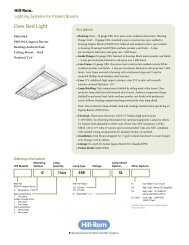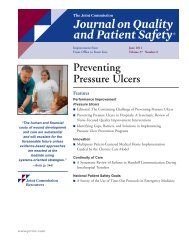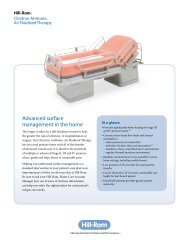Hill-Rom Global Code of Conduct
Hill-Rom Global Code of Conduct
Hill-Rom Global Code of Conduct
You also want an ePaper? Increase the reach of your titles
YUMPU automatically turns print PDFs into web optimized ePapers that Google loves.
Q:<br />
Marissa, a <strong>Hill</strong>-<strong>Rom</strong> Regional<br />
Director, and her sales team<br />
have exceeded their revenue<br />
goal for the quarter. Marissa plans to<br />
record the revenue that is above her<br />
area’s goals in the next quarter. This<br />
way, they’ll reach their goal for the<br />
next quarter, too. Can she do this?<br />
No. Marissa and her area must<br />
A: recognize all revenue in the<br />
period that it is earned. This is<br />
necessary to comply with acceptable<br />
accounting principles. In addition to<br />
satisfying applicable laws and standards,<br />
we must be sure to maintain accurate<br />
books and records so we can make<br />
informed business decisions for the<br />
benefit <strong>of</strong> our stakeholders and<br />
our company.<br />
<strong>Hill</strong>-<strong>Rom</strong> <strong>Global</strong> <strong>Code</strong> <strong>of</strong> <strong>Conduct</strong> 28<br />
Maintaining Accurate Books and Records<br />
All <strong>of</strong> our stakeholders — and in particular our investors, auditors and<br />
regulators — depend on us to keep records <strong>of</strong> our business on which<br />
we and they can rely. We must record and report information so that it<br />
reflects an accurate and complete picture <strong>of</strong> our business transactions.<br />
We must never knowingly create or participate in creating incomplete<br />
or misleading information or inaccurately record the timing <strong>of</strong> any event<br />
or transaction. Each <strong>of</strong> us is responsible for the accuracy <strong>of</strong> the records<br />
we create and maintain.<br />
Manufacturing<br />
We must keep our manufacturing and quality inspection records<br />
accurately and completely to facilitate inspection, audit review,<br />
and regulatory reporting.<br />
Sales and Distribution<br />
We must keep accurate written records <strong>of</strong> our product sales<br />
and distribution so that we can generate accurate financial<br />
reports and projections.<br />
Financial Information<br />
It is critical that we prepare and maintain accurate financial records.<br />
We must make full, fair, accurate, timely, and understandable<br />
disclosure in reports that our company files with our financial<br />
regulators and in other public communications made by our<br />
company. We must do this in accordance with the Generally<br />
Accepted Accounting Principles and other applicable auditing<br />
and regulatory guidance.<br />
Should you become aware that any company books and records<br />
are inaccurate or misleading, you must immediately raise the<br />
issue with your manager. Inaccurate financial records must<br />
immediately be reported to the Finance Department or the<br />
Compliance Office.<br />
November 2011<br />
Insider Trading<br />
We are strictly prohibited from buying or selling <strong>Hill</strong>-<strong>Rom</strong><br />
securities (like stock, options, and bonds), or the securities<br />
<strong>of</strong> other companies, on the basis <strong>of</strong> “material inside information”<br />
that we learn <strong>of</strong> in a variety <strong>of</strong> ways, including by way <strong>of</strong> our<br />
work with <strong>Hill</strong>-<strong>Rom</strong>. We also are prohibited from sharing this<br />
information with others outside our company so that they can<br />
buy or sell <strong>Hill</strong>-<strong>Rom</strong> or other securities with the benefit <strong>of</strong><br />
material inside information. Directors, <strong>of</strong>ficers, and other<br />
designated “insiders” may face even further restrictions.<br />
What is “Material Inside Information?”<br />
In general, this is information that has not been made public<br />
and that a reasonable investor would find important when<br />
deciding whether to buy, sell or hold a corporation’s securities.<br />
Information is considered public only if it has been made<br />
generally available to investors, such as in our company’s filings<br />
with the U.S. Securities and Exchange Commission or in a press<br />
release, and if investors have been allowed a reasonable period<br />
to react to the information (normally within two trading days).<br />
Some examples <strong>of</strong> material inside information could include:<br />
• Non-public financial results, such as monthly or quarterly<br />
revenue, net income or earnings per share;<br />
• Mergers, acquisitions, and important business developments;<br />
• Important regulatory or litigation developments; and<br />
• Development or release <strong>of</strong> significant new products or recall <strong>of</strong><br />
existing products.<br />
Violation <strong>of</strong> insider trading laws is a serious crime and can result in<br />
significant civil and criminal penalties. We must follow our Insider<br />
Trading Policy and consult with the Legal Department to resolve<br />
any questions we may have before we trade in <strong>Hill</strong>-<strong>Rom</strong> securities.<br />
<strong>Hill</strong>-<strong>Rom</strong> <strong>Global</strong> <strong>Code</strong> <strong>of</strong> <strong>Conduct</strong> 29
















